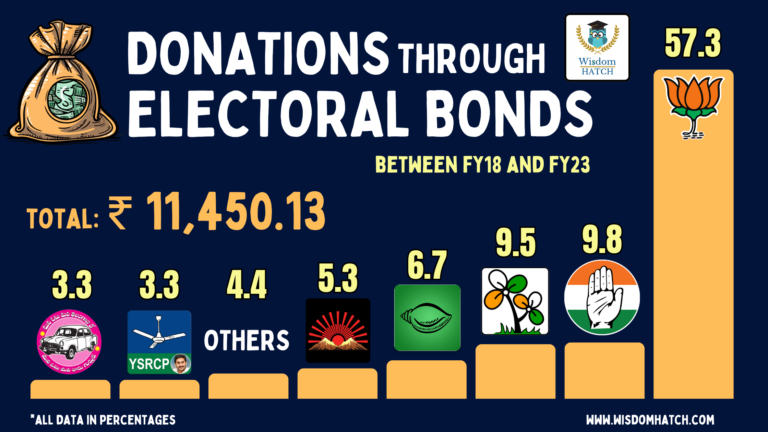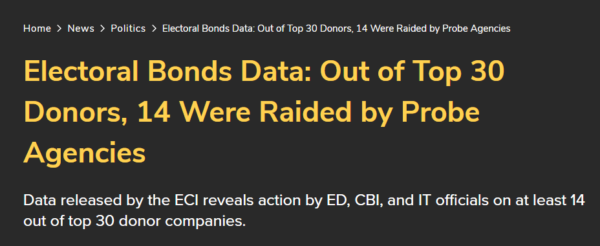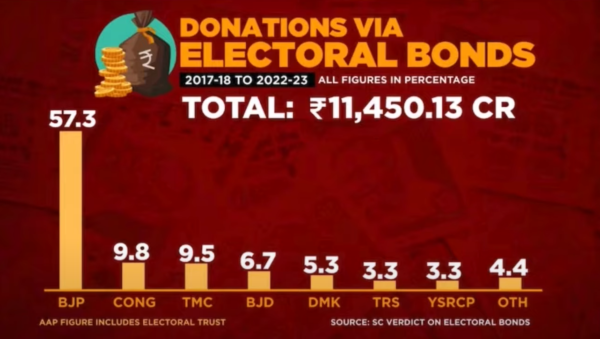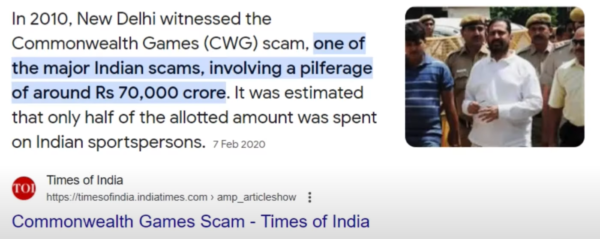Understanding Electoral Bonds:
A Deep Dive into India's Political Funding System

Did you know that some Electoral Bond donors donated more than 5-10x times their net profits.
The data does not lie.
Where is all this money coming from?
Where are they going?

Electoral bonds have been a topic of discussion and debate in India’s political landscape.
These bonds were introduced to tackle the issue of black money in political funding and provide transparency in the process.
However, recent revelations have raised questions about the effectiveness and fairness of the electoral bond system.
In this blog, we will cover:
- What are Electoral Bonds? Why was it introduced?
- Does Electoral Bonds really help?
- End-to-End system of Electoral Bonds
- Is there a Quid-Pro-Quo System at play?
- Is there a Solution to all of this?
The Need for Electoral Bonds
Elections in India are known to be extremely expensive endeavors.
As per legal limits,
- INR 95 Lakhs and INR 70 Lakhs for Parliamentary Constituency
- INR 40 Lakhs and INR 28 Lakhs for Assembly Elections
However, as per unofficial data, the actual spend is around 40x the allotted budget for parliamentary elections and 15 times for assembly elections..
The legal limit for campaign expenditure is significantly lower than the actual amount spent by candidates.

To bridge this gap, political parties often rely on donations from individuals and corporations. However, this traditional method of funding raised concerns about the influence of black money in politics.
To address this issue, electoral bonds were introduced as a solution.
By using electoral bonds, it was believed that the flow of black money could be curbed.
The Concept of Electoral Bonds
Electoral bonds are essentially a financial instrument for making donations to political parties.
A key element of an EB is that it would be a Bearer Instrument.
They were designed to maintain the anonymity of the donor while ensuring transparency in the process.
This is simply to avoid internal and external conflicts between political parties and with donors.
However this anonymity isn’t very much there.
If you take a look at a sample of an Electoral Bond, you can see SBI at the top.

This is because SBI is the Nodal Agency which manages the process of Electoral Bonds.
This brings the anonymity of electoral bonds under scrutiny. As the SBI, a government-appointed institution, manages the entire process, the concept of anonymity becomes questionable.
Now the key point is that:
- The SBI chair is elected by the government.
- In that case, the whole point of Anonymity is no longer there.
- It just means that the Party controlling SBI has exclusive access to this Electoral Bonds List.
This raises concerns about the privileged access to information that the ruling government may have compared to other political parties.
Ask yourself: Can this information not be used by this Party to initiate a Quid Pro Quo system?
What do you mean by a Quid-Pro-Quo system?
A political party that has access to the information of the donors, can initiate a system where they can return favors in return of getting donations.
In simple words: You give me X, I return the favor through Y.
The Challenges with Electoral Bonds
While electoral bonds were intended to eliminate the problem of black money, several shortcomings have emerged.
The main issue still stands.
More than 50% of the money used in Elections are still not financed through Electoral Bonds.
This means that Black Money is still the leading contributor to the elections financing.
And there is also a new problem at play.
The introduction of EB abolished the ceiling on contributions that can be made by corporations.
This in turn led to a surge in funding from corporations, raising questions about the source of these funds and the potential for undue influence on political parties.

And the situation clearly shows that most companies are donating amounts that are much higher than their net income to Electoral Bonds.

Let’s further break down this data.
Corporations and their Donations
The above data reveals significant contributions made through electoral bonds.
Some companies, despite reporting low profits, have managed to donate substantial amounts.
Some even report negative profits.
This raises questions about the legitimacy of these donations and the possibility of temporary funding arrangements.
Furthermore, the timing of certain donations raises suspicions. Cases have been observed where companies faced scrutiny from government agencies, and shortly after, made significant purchases of electoral bonds.
This has led to speculation about the existence of a “carrot and stick” approach, wherein rewards or punishments are meted out based on political donations.
This is precisely what the Quid-Pro-Quo system highlights.
If you take a look at top donors, you can clearly notice the trend.
This favors could be through:
- Contracts or Projects awarded
- Leeways after Raids/Scams (14 out of the top 30 donors were raided before they placed their donations)
Taking an example:
Future Gamings & Hotels
- On April 2nd 2022, ED attached assets worth INR 410 crore.
- 5 days Laters, company purchased bonds worth INR 100 crore
In total INR 1,368 crore EB were purchased by this company.
Close to 50% was purchased after the ED raid.

This was not a one off case.
As per reports,
14 out of the top 30 Donors were raided by Probe Agencies, prior to most of their donations.

FAQs:
1. If all parties are benefiting from EB, why is the current government getting heat?
- Its because they have received the highest portion of this funding
- Almost 57%.
They have exclusive access to this data, which they can use for the quid pro quo system.

2. How are firms able to donate 1000s of crores of money without being profitable?
Where is all these donations money coming from?
Most likely answer is that they are getting temporary funding which could either be legitimate or not.
3. Why can’t judges show the same level of transparency that they are expecting from parties?
The key difference that you need to understand is that it’s not just about transparency but rather about access to privileged information.
Even the Supreme court deemed the Electoral Bonds scheme as not ‘fool-proof’.
Since it is not fair to all political parties.

4. Has electoral bonds solved the black money problem in India?
Black Money problem is still very prevalent.
And since India still majorly works on the unorganized sector, this issue will continue to prevail.
Is there a solution?
There are 2 ways to tackle this problem:
- Funding Limit
- Centralized Impartial Body
For the first part,
- Why are there no Limitations on Electoral Funding?
- Why are there no limitations on Funding received by each Party?
Just like how there is a limit to how much money you can withdraw from an ATM.
There should be a limit to how much bonds can be purchased and received.
The second part,
There needs to be an actual impartial Constitutionally Appointed Body who is not directly influenced or linked with the ruling Party to look over the Scheme.
This is more likely to invoke transparency and equal access to information to all stakeholders.
How does Electoral Bonds affect all of us?
Firstly, The electoral bond system has had far-reaching implications for India’s democratic process.
The current ruling party has received a significant portion of the electoral bond funding, leading to concerns about the fairness of the system. This unequal distribution of funds can undermine the principles of a free and fair democracy.
Secondly, the existence of a quid pro quo between donors and political parties can result in inefficiencies and corruption. The funds donated by corporations may be aimed at securing favorable treatment once the political party comes to power.
An example of this would be the Commonwealth Games Scam.
Ultimately all of this money needs to be traced back and can come back to you through higher taxes.
A more efficient system could mean that the surplus money can be used effectively for the nations and the peoples growth.

Conclusion
Electoral bonds were introduced with the aim of curbing black money and bringing transparency to political funding.
However, recent revelations have raised serious questions about the effectiveness and fairness of the system. The lack of anonymity, privileged access to information, and questionable timing of donations have cast doubts on the integrity of electoral bonds.
It is essential for citizens to understand the implications of the electoral bond system on the democratic process.
By advocating for a more transparent and accountable political funding system, we can strive towards reducing corruption and promoting the efficient use of public funds. As responsible citizens, it is our duty to stay informed and actively participate in shaping the future of our nation.
•Electoral bonds introduced to tackle black money and provide transparency in political funding.
•Recent revelations raise doubts about their effectiveness and fairness.
•What are Electoral Bonds?
- Financial instruments for political donations, aiming to maintain anonymity of donors.
•Challenges with Electoral Bonds:
- Over 50% of election funds still not from bonds, indicating black money’s prevalence.
- Corporations donate significant sums, sometimes exceeding their profits, raising suspicions.
- Timing of donations, especially after government scrutiny, suggests a quid-pro-quo system.
•FAQs:
- Current government receives the highest portion of funding, raising concerns about access to data.
- Firms donating large sums may be using temporary funding sources.
•Is there a Solution?
- Implement funding limitations and establish an impartial oversight body.
•Implications:
- Unequal distribution of funds undermines democracy’s fairness.
- Quid-pro-quo dealings can lead to inefficiencies and corruption.
•Conclusion:
- Electoral bonds aimed to curb black money but face integrity issues.
- Citizens’ awareness and advocacy for transparent funding systems are crucial for reducing corruption and promoting public fund efficiency.
MUST know BEFORE you become an Airbnb host
Medium Article Preksha Chand edit post MUST know BEFORE you become an Airbnb host Medium Article Preksha Chand edit post MUST know BEFORE you become an Airbnb host Medium...
Make more money from your property: Short-term rental [Airbnb]
Medium Article Preksha Chand edit post Make more money from your property: Short-term rental [Airbnb] Medium Article Preksha Chand edit post Make more money from your property: Short-term rental...
GOA Airbnb Laws: What Hosts Need to Know [2024]
Medium Article Preksha Chand edit post Make more money from your property: Short-term rental [Airbnb] Medium Article Preksha Chand edit post Make more money from your property: Short-term rental...





